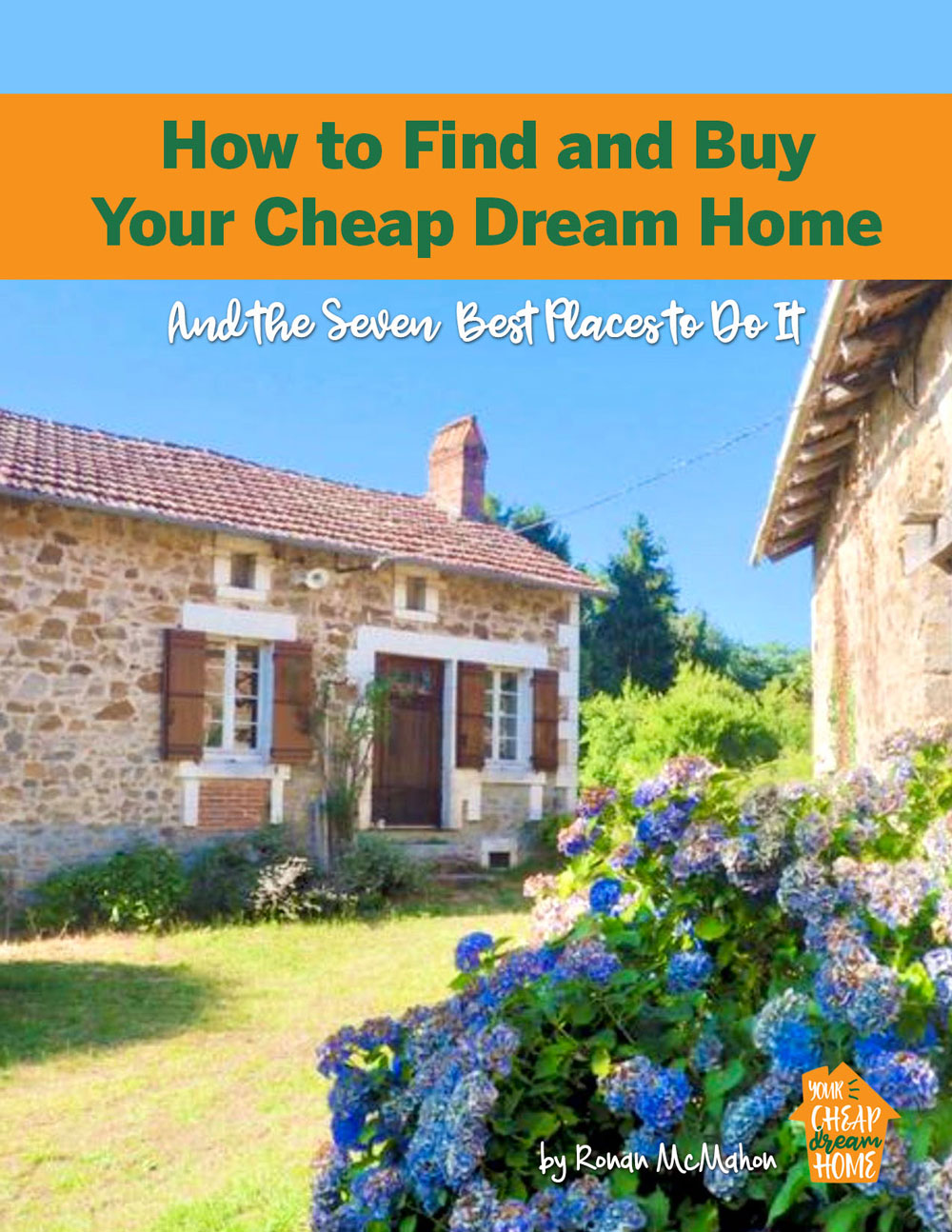
How to Find and Buy Your Cheap Dream Home
(And the 7 Best Places to Do It!)
You love the idea of a dream home overseas and you want to take a big step toward making your dream a reality.
I'm here to help.
But who am I?
My name is Ronan McMahon and I love real estate and travel.

I love them both so much that straight out of college (a long time ago) I began crafting a life as an international real estate scout and investor. I've bought and sold property all over the world for fun and profit...Ireland, Mexico, Panama, Brazil...
I typically spend at least six months of every year on the road scouting real estate markets.
Discovering cheap dream homes is my fun side project...
Homes in places you thought you could only dream about for under $100,000 started with my team and I sharing our discoveries from around the world with each other...a WhatsApp message here...an email there...
I started posting the best of these to an Instagram page I created called Your Cheap Dream Homes, as a way to share our love of cool properties with friends, family and other like-minded folks who love real estate and travel.
With that page quickly growing to over 200,000 followers, I created this special report to help others find and buy their cheap dream home.
We're not the selling agent of any of these properties. There's no catch. We have no commercial relationship with any of the agents, in fact we don't even know them. We just love bargains, spectacular views and characterful homes...it's up to you to do your own bargaining and due diligence. (Right now with good negotiating skills you can get 30% to 40% off asking prices in some places.)
My professional focus is different. For over a decade I've been bringing serious real estate investments to my premium investor's group—Real Estate Trend Alert—real estate plays with which you could double your money in less than five years.
But even without a hard-nosed investment case I get a kick out of the romance of a stunning property in a beautiful location at a knock-down price.
Your Cheap Dream Home shines a light on the overlooked bargain gems that my team and I uncover on our travels and through our contacts.
And it's fast become something more...
In a short time, we've had so many questions from folks all over the world. I've been blown away by the enthusiasm and encouragement for Your Cheap Dream Home...
So, I created this report to help you take your next steps...
In 2008, as the world careened into crisis, I bought a condo in the mountains of Ecuador.
I didn't buy it to make money. It was my "pocket money" bolt hole, a place where the air was clear, the water pure, and I would have the option of riding out major global calamities.
As the 2008/09 financial crisis blew up many of us feared the ATM machines would stop working. A bolt hole seemed smart and the small town of Cotacachi was perfect.
The property was a penthouse suite of about 800 square feet inside and 700 square feet outside. I was tired, busy, and rushing around as the world appeared to unravel. In the West banks collapsed, people lost jobs and saw pensions and savings decimated...
Up there I slept like a baby, the air was crisp and clear. The views from my terrace to Cotacachi were what really sold me on it. That's where I imagined I'd spend time. Reading, writing, eating healthily.
The suite was one big room with lots of scope to create a charming space. My friends Dan and Suzan were neighbors and did exactly that.
But I never got around to furnishing or laying out the interior. In the end, I didn't need my bolt hole in the Andes.
The world kept spinning and amid the crisis came incredible real estate opportunities. Real estate deals in Brazil...crisis fire-sales in Europe...
I sold my bolt hole property with no regrets. I was on the road fulltime scouting real estate with no time to visit.
Today, over a decade later, I own part-time bases around the world, though none in Ecuador. My criteria for a base include never needing air-conditioning nor heating, being close to a golf course and to an airport. I'm writing this on a bench with a view of the Pacific, close to my condo in the 5-star Quivira Resort in Cabo, Mexico.

I have a research team strung out in bases around the world. I have contacts across the globe.
All of these people love real estate and have an eye for a bargain. Some love rural retreats, others like lock-and-leave apartments in buzzing cities...
I've leaned on my team and contacts for this report, but much is the result of my own experience and scouting.
If you love real estate and you like bargains read on...
I've homed in on locations I think offer the most bang-for-buck and given you a range of sample properties and some places to get started with your own search.
And I share some of my best tips and advice for how you can take your next steps to owning your dream home overseas...
There's never been a better time to get started...

Ronan McMahon,
P.S. I'm giving you a lot of links to property listings in this report. Some of these might get sold, which means the listing gets taken down. But I'll work to keep the listings "live" and up-to-date as my team and I find hot-looking bargains...and of course the best place to find cheap dream homes is on overseasdreamhome.com.
Can You Buy Property Overseas?
Let's get something out of the way...
The number one question I get asked is can I buy real estate in such and such a place.
It could be France, Portugal, Panama, Mexico, Ireland, Italy...
Wherever you are interested in a cheap dream home it's understandable your first question is "Can I actually buy there?"
Yes, you can.
That's the short answer.
In every country featured on Your Cheap Dream Home a foreigner can legally buy and own real estate (albeit we had one dream home featured in Thailand where there are some restrictions.)
Not only can you buy property, but in some countries you can get a mortgage.
For example, in Portugal foreigners can borrow up to 80% of the value at really low interest rates. I know people from the States and Canada who have 1.3%.

Foreigners can also borrow from banks in France, Italy and Spain. Imagine owning a cute little home with a small downpayment and just a few hundred bucks a month! (More on using foreign bank mortgages and other ways to finance further on in this report.)
I often hear people's concerns about investing in a foreign country because "those governments could just take your property away."
In the 17 years I have been a fulltime international real estate scout I have not come across one case of a remotely serious country taking people's property. I've read about people claiming for example they had property taken from them in Spain. When I examined the details, it turned out they never legally owned the property. They were scammed. The property never had permits or existed in a legal sense. I feel bad for them but if they had got a lawyer to represent them they would have been told to run a million miles.
For countries with economies reliant on tourism and international investment it would be economic suicide for them to take such action. There are lots of crazy leaders out there I hear you say...yes, and no. There are leaders who say crazy things but they follow a rational strategy to stay in power. Any leader who gave foreign investors reason to pull out of their country would be thrown out of power.
Later in this report I give you some tips on mistakes to avoid when buying overseas.
But first a quick word on residence...
Whether or not you can live full time in a country depends on your own citizenship and the rules of the country you're interested in. Books have been written on residence...big books.
It's not my area of expertise but as I get a lot of questions on it, here's some general advice from someone (me) who has two passports and legal residence in an additional two countries...
There can be very significant tax benefits to choose where you are tax resident. For example, you could establish tax residency in Portugal and be taxed at somewhere between 0% and 20% depending on the type of income. Tax strategies are beyond the remit of this report.
Residency or the right to live and work year-round can be achieved in a variety of ways...an Irish grandparent...a European Jewish blood line...filling in some forms and paying a modest fee in Panama or Mexico. Then there's a raft of investment programs that grant residency rights. Thing is, unless you plan to live year-round, and not travel, you likely don't need to get residency. Most countries allow you to stay three to six months on a tourist visa. If you leave the country and return the clock starts ticking again.
Now...let's look at some dream homes!
The 7 Best Places in the World to Look for Great-Value Real Estate
Bargains in Portugal
Until recently Portugal was a secret. Sure, millions of tourists visited the beaches of the southern Algarve, which gets 300 days of sunshine a year, but beyond that the country was pretty unknown.
I've been scouting here for years. I've spent many months on the ground and I now plan on buying a property on the Algarve, my own place to use as a part-time base and rent for income the rest of the year.
I've found a lot of opportunity for serious real estate investment in Portugal. It began with the crisis of 2008/09 which hit Portugal hard and—after a few years of no movement in the market—gave savvy investors the chance to snap up bank fire sales and double their money around the Algarve on the south coast. I found opportunities in the cities too, especially in Porto in the north. (And I think the latest crisis is going to see a crash in prices in Lisbon and perhaps some killer bargains.)
But if you're budget is under $100,000 and you just want a dreamy property...there's so much on offer.
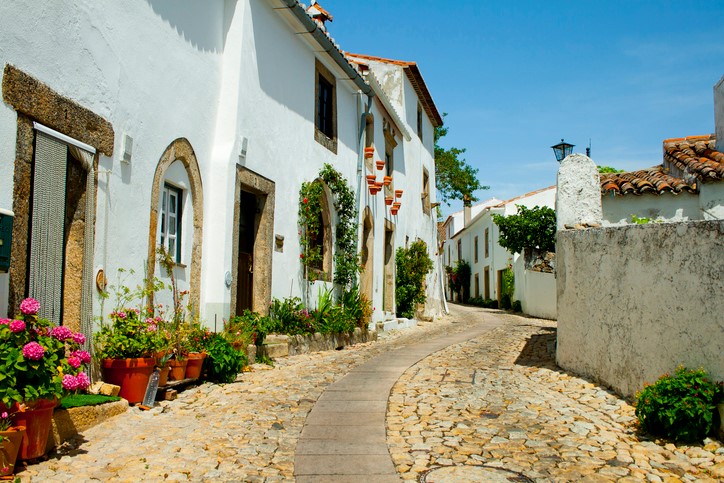
Portugal has mountain villages and hidden hill-towns where time slows down and the food is farm fresh every day. There's rich rolling hills, sun-drenched vineyards, and vibrant little university towns. The cost of living is incredibly low, the people are so polite and friendly...
The trouble is that there are so many bargains it's a case of where to start...
Want to own close to a historic town, good transport links, and the Atlantic beaches? No problem, look between Coimbra and the sea. Do you want land, an olive grove, orange trees and a mountain view? Try the upper Alentejo region.
It's exciting looking for property in Portugal...it's rocket-fuel for anyone's dream of a more international life...
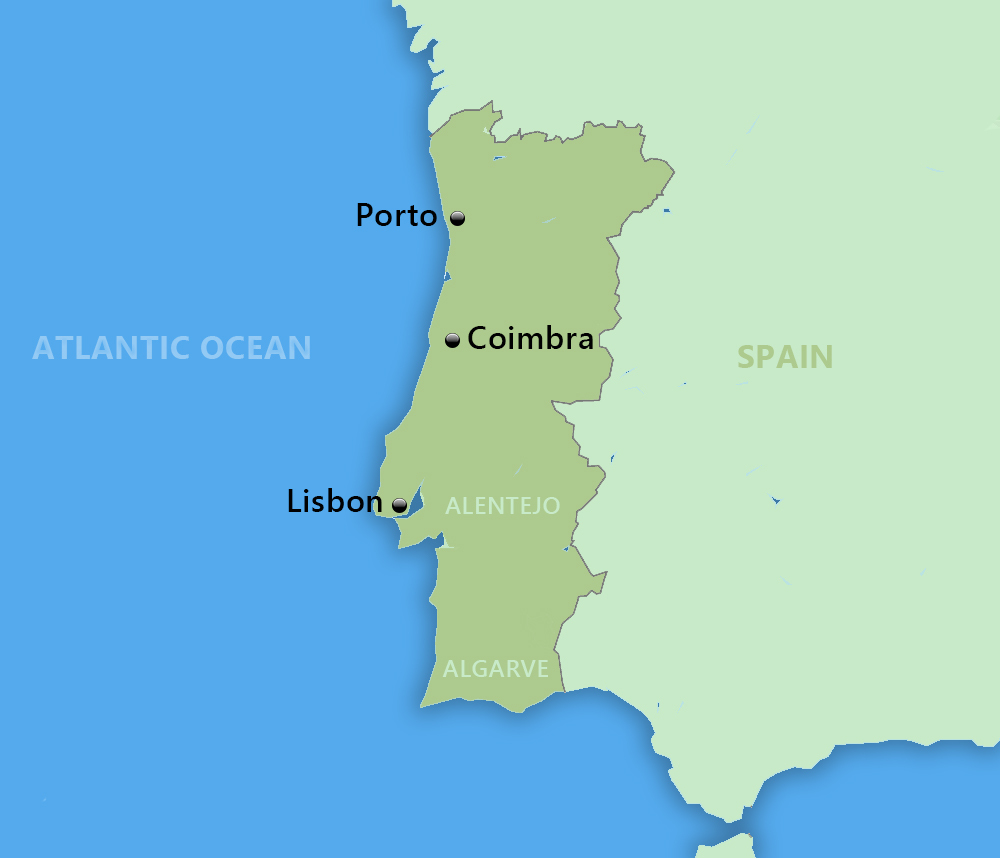
and glorious countryside.
Portugal is an extremely attractive place for mobile people. It's safe, secure with good transport and infrastructure. The education system is good and the cost of living is incredibly low. The authorities have been smart about this with their Golden Visa and non-habitual resident regime. The Golden Visa is a fast-track visa program for investors from outside the European Union.
And there's a kicker: Portuguese banks are lending to foreigners as much as 80% at interest rates as low as 1%. This has created amazing opportunities to use leverage to double our money with profitable plays.
Now imagine buying that dreamy historic home with bank financing and owning it for just a few hundred bucks a month...it's completely doable. Let's look at some examples...
- €69,900 ($84,544): A one-bed, one-bath townhouse in Serra d’El-Rei, close to Portugal’s Atlantic Coast and just an hour’s drive from Lisbon. The home comes fully furnished, with a bright open-plan kitchen, dining/living area and a mezzanine level. Serra d’El-Rei’s claim to fame is that it’s where the 14th-century King of Portugal, Peter I, lived with his lover Inês de Castro. See the listing here.
- €60,000 ($72,570): A two-bedroom farmhouse with a small lot of land and close to a country village. This is an ideal country retreat, complete with stunning views of the Zêzere river and valley. The house has a rustic kitchen with traditional open fire-place, and an old bread oven. On the land, you have olive, orange, and cherry trees. There two cafés and a mini-market in the nearby village. You’re within 13 miles of the towns of Pampilhosa da Serra and Pedrógão Grande, where you find all essential amenities. And both Lisbon and Porto are within a two-hour drive. See the full listing here.
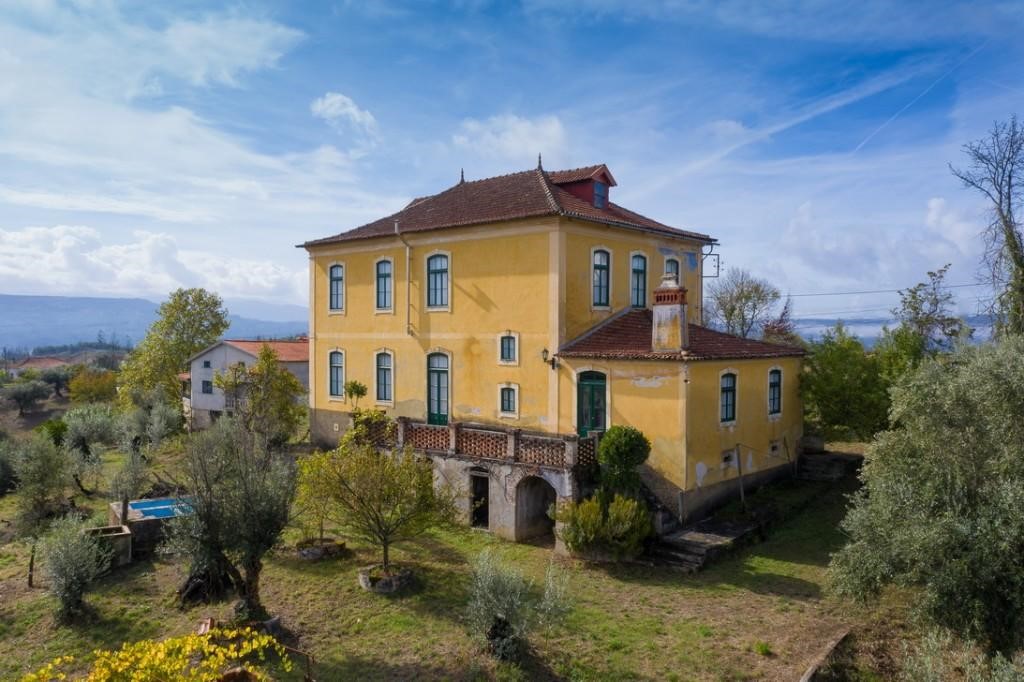
- €249,000 ($301,165): Spend a little more in Portugal and you can find something truly remarkable. This seven-bedroom manor house comes with a full farm of almost 10 acres, with cork trees, olive trees and fruit trees. The house is in the Arganil municipality, close to Coimbre, a city steeped in history and considered "the Oxford of Portugal" thanks to its universities. See the listing here.
Homes for Free in Italy
The cradle of the Renaissance, the birthplace of opera, the country that gave the world Italian food... Italy is jammed with treasures, many of its cities are themselves works of art. You can wander along old Roman streets, stand in the shadow of the Colosseum or just sip espresso with the locals. For culture look no further, enjoy Verdi in the birthplace of opera, visit the lavish home of the Pope adorned with priceless works of art...and the cities are only the start...
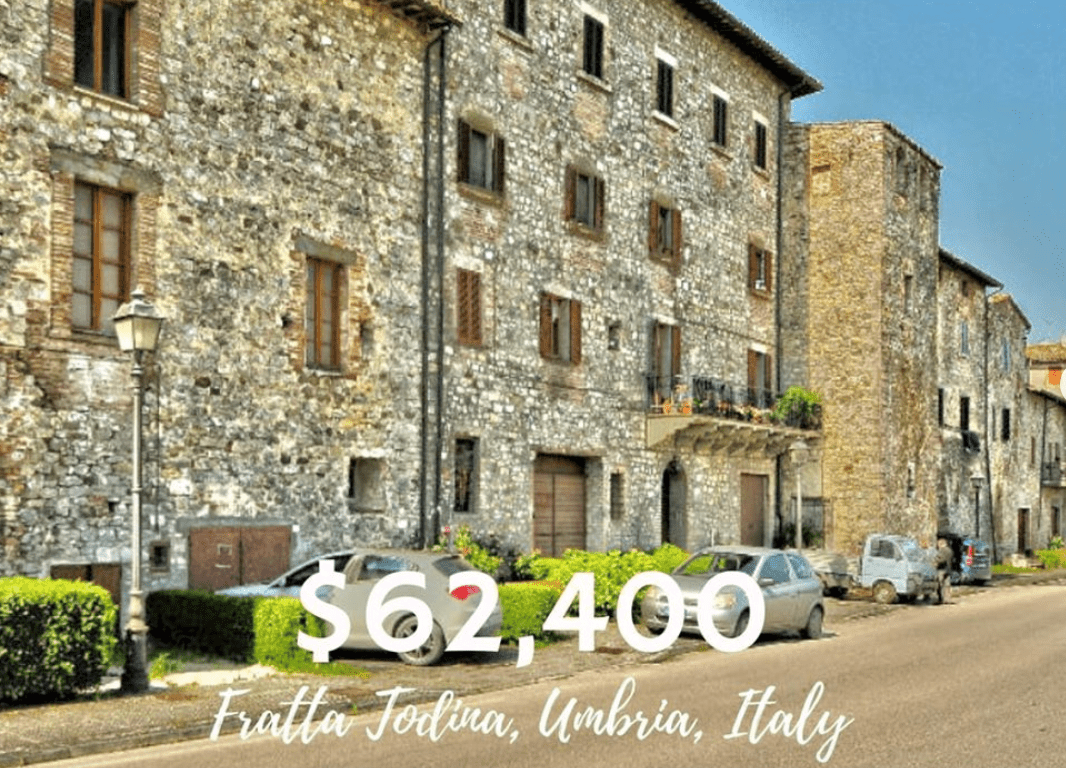
Italy has many small art towns which offer great attractions...medieval gems set amongst lost-in-time landscapes, sun-drenched vineyards, olive groves, and wildflower meadows...gentle wooded hills crowned with castles and medieval villages...
Long before Covid-19 ravaged Italy I saw the convergence of compelling global trends there that I expect to continue. That's why I've been digging there for the past several years. Italy is a blue-chip tourism destination, the fifth most-visited country in the world. Tourism will bounce back...in blue chip locales. Venice will still be Venice. Rome won't lose its appeal. Owning the right overlooked property in these places could get you a stunning rental return, I'm talking a gross 15% yield.
Before the current crisis Italy was already in a terrible state. It had some of the highest debt-to-GDP ratios in the world with an outstanding debt of $2.5 trillion.
The country has struggled since the 2008/09 financial crisis and it looks to be in a state of almost permanent political crisis. Foreign direct investment tumbled. Throw in corruption, weak institutions, a brain drain and a lack of confidence among Italians of anything changing, and then Covid-19 and the shutdown of the economy.
Real estate prices have still not recovered from 2008. Now we will see big falls in value of best-in-class real estate. I'm figuring on 30%. The value of marginal real estate in the hills and empty villages will go to zero.
Even before Covid-19 Italy has been giving away free or virtually free houses for years in an effort to re-energize depopulated hill towns. These are often historic, beautiful towns in stunning places, but there's no work for the young. And while it depends on the town, in order to get one of these homes, you do have to make a commitment to renovate the home and use local craftsmen. (One of my big ideas for a while has been to get a whole town for free and bring it back to life. I'm now getting serious about it.)

The country is jam-packed with cheap dream homes, just pick a region and start looking. Here's a taste of what I've come across...
- €33,000 ($39,913): This one-bedroom apartment in the medieval hilltop town of Castel Viscardo comes with a small garden, a large old tavern, and cellar for storing wine. Castel Viscardo is just an hour-and-a-half drive from Perugia, within two hours of Rome, and within three hours of Florence, making it an ideal spot for exploring the best of central Italy. Visit the listing here.
- €80,000 ($96,543): This large historic building in the town of Calvi dell 'Umbria sits right on the main square, next to the Museum of the Ursuline Monastery and across from a café. The property is on four levels and has over 10 rooms. See the listing here.
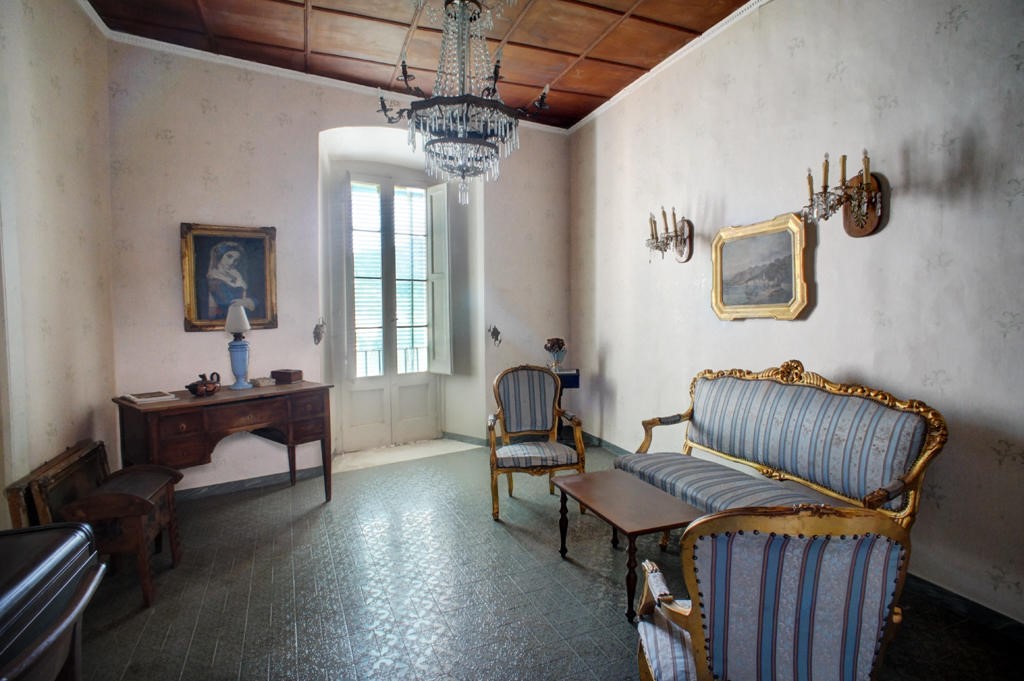
- €160,000 ($193,520): A three-bedroom apartment situated in the heart of the medieval town of Arpino. Arpino is a warren of cobbled streets, pretty piazzas, ancient ruins. The area is known for its culinary traditions, which derives from the bounty of the surrounding mountains. Fresh ricotta cheese, tender goat meat is baked in wine and herbs, winter seasoned pork sausage, and truffles and mushrooms from nearby forests. The apartment itself dates from the 1800s, and has panoramic valley views, a spectacular salon with vaulted ceilings and columns, floor length picture windows with wrought-iron railings, and an antique fireplace. It’s also just a few minutes’ walk from the main piazza. See the listing here.
Romantic Spain
Like Italy, Spain offers you Europe at its most romantic...full of historic hamlets, dramatically perched hill towns, stunning country homes, and glorious art-filled cities with centuries of history all around you.
Now Spain's fragile and debt-laden economy has taken another serious hit, and as in Italy, we're set to see big falls in the value of real estate and some outstanding bargains.
If you're interested in a stupendous bargain on a stunning dream home you have a huge choice...
As in Italy, mass migration to the cities has left a glut of unoccupied homes across the country crying out for someone to love and enjoy them.
Spain's big and its climate is varied. You'll find the best weather in the south, close to the Mediterranean. Spain has one of the longest coastlines in the Mediterranean and you have a lot to explore. I've always liked bargain hunting in the traditional white-washed villages with echoes of North Africa tucked away in the mountains back from the coast.
Spain's "Green Coast" is the stretch of the country along the Atlantic Ocean, a land of stunning mountains, verdant forests and white-sand beaches fringed by emerald-green fields. It rains here, hence the greenery, but if you don't mind that you can find country houses between the soaring Picos de Europa (Peaks of Europe) and the beaches for less than $100,000.
Spain's wine country is worth a mention...the northern province of La Rioja is the center of wine production in Spain and you can own a village home among the vineyards for a steal.
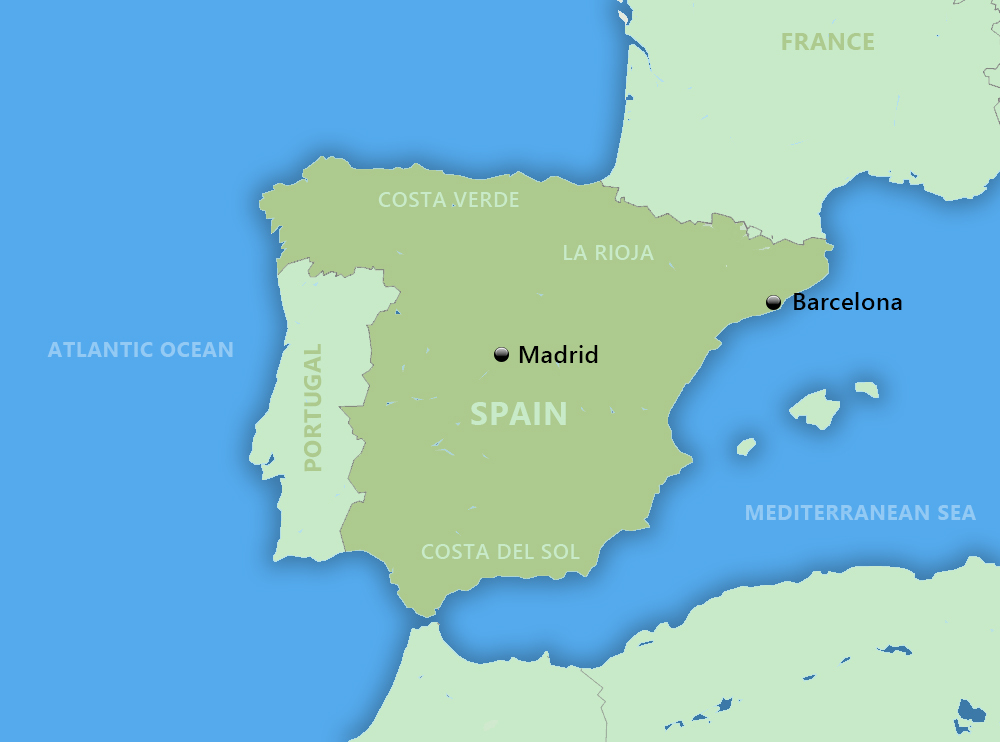
Then there's the cities...take Spain's third-largest, Valencia, which lies in the middle of Spain's Mediterranean coastline. There are long stretches of beach in the city and the place is full of parks. As befits any 2,000-year-old city there is a lovely old town quarter. And you can find plenty of apartments walking distance to everything priced below $100,000. That's just a whirl-wind introduction to a big, varied country with over 3,000 miles of coastline, snow-capped mountains and arid deserts. Here are a few examples...
- €85,000 ($102,572): This three-bedroom stone house is in the tiny village of Muras, between the mountains of Muras and the beaches of Viveiro. Fully renovated, it has an open-plan living/dining room with a wood beam ceiling and an upper floor with a large balcony. The house is south facing so gets plenty of light. See the listing here.
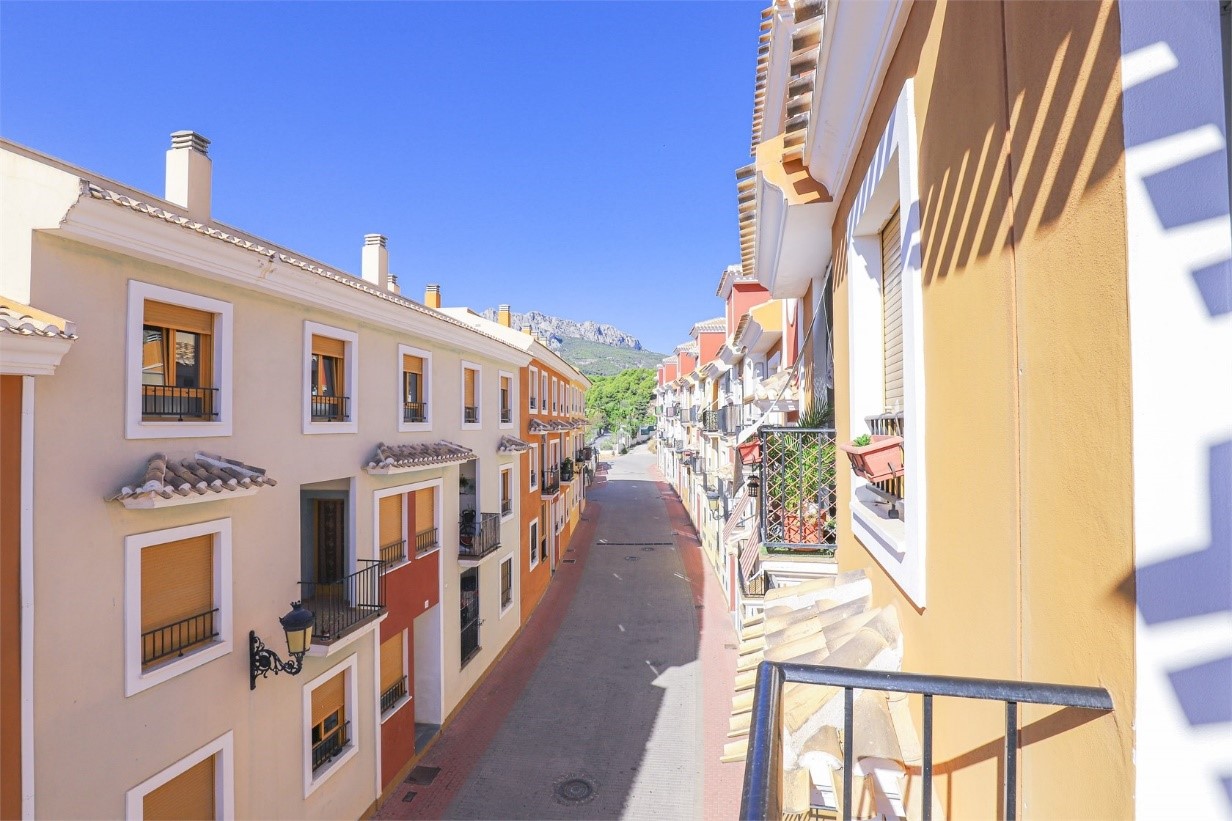
- €85,000 ($102,409): This three-bedroom apartment in the peaceful town of Xirles is just a 20-minute drive from Mediterranean beaches. In the municipality of Polop on Spain’s Costa Blanca, the town has a stunning mountain backdrop, with lots of local forests to explore, an ideal location for hikers. The apartment comes furnished and with air conditioning. It has a nice sunny balcony and also gives you access to a communal solarium-type terrace where you can enjoy the beautiful mountain views with your neighbors. See the listing here.
Bang for Your Buck in France
Whether you dream of a pied-à-terre or a rambling farmhouse...or a village house wrapped in wisteria-hung memories of long ago, France has something for you...
There are scores of hidden corners of France for bargain hunters.
British and Irish buyers discovered the charms and value of France a long time ago. It was a five-minute conversation with a bank manager in London or Dublin and your home was re-mortgaged to get your French idyll. Many embarked on extensive renovations thus creating many of the very high-quality resale properties we have today.
My most recent scouting trip to France in the summer of 2019, took me to the Languedoc (now officially known as Occitanie) region, right next door to Provence. I found historic turn-key village homes that I figure could throw off a healthy 6% gross yield renting during the summer peak season. Then you get to spend time there the rest of the year. (They were in the $230,000 to $350,000 price range.) And the city of Montpellier is high on my watch list, a vibrant university town steeped in history and just a 20-minute tram ride to Mediterranean beaches.
Once known as the "poor man's Provence" the Languedoc region of southern France is slowly arriving as a destination.
The Languedoc's Mediterranean coast is part of France's sun belt, and its long sandy beaches are still fairly uncrowded. Inland, you'll find wild mountain ranges, dramatic gorges and stunning hill towns that many Francophiles will tell you are more authentic than what you'll find in over-touristed and over-priced Provence.
If your idea of France is fairy-tale castles perched on rugged mountain peaks and medieval villages where the food is amazing and the wine is local, then you'll find everything you want in the Languedoc.
And if you yearn for Mediterranean views, long beach strolls and fresh seafood, then the Languedoc has that, too.
Languedoc-Roussillon essentially covers the area of southern France where the Occitan language was once the common tongue. It's just west of Provence, stretching all the way to the Spanish border where you'll find Roussillon—French Catalonia—sandwiched alongside the Pyrenees Mountains.
As you move inland from the sea, the sun-drenched coastal plain gives way to rolling, forested hills and jagged mountains. No other part of France I know of is so varied. In fact, the micro-climates you'll find in the Languedoc can pose a challenge to the real estate buyer. A short drive from one village to another can mean a difference of a few degrees in temperature.
That matters if you're considering a place you can rent out in the peak months of the summer and spend time enjoying during the off season. You want to buy in a place where the climate is still warm enough for short sleeves in September and April. You'll find that in the Languedoc, but my point is you need to choose carefully.
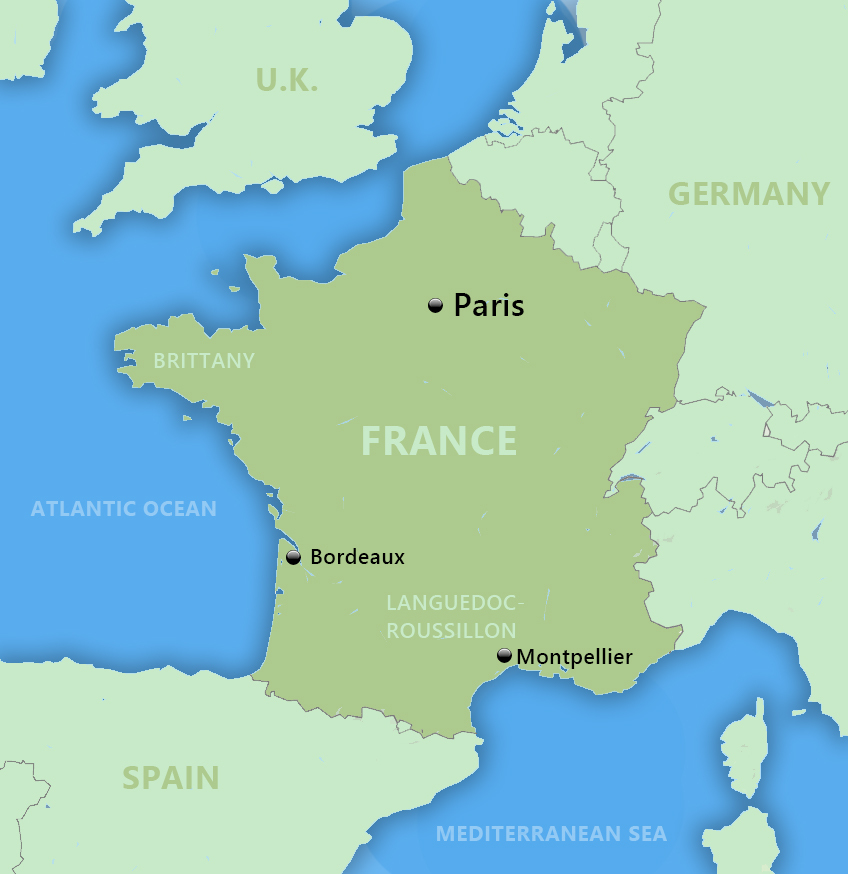
But the Languedoc is only the beginning...I have a member of my research team primed for an extended scouting trip down the Atlantic coast from Brittany to Bordeaux and I'm planning my own return to scout French real estate markets for opportunity in the wake of the crisis. To whet your appetite for bargains...
- €72,000 ($85,086): Not only is the stairs medieval, but so is the sink...own a three-bedroom village home with exposed wooden beams, two bread ovens and a wood-burning stove in the heart of the Lot valley. The house is in Puy L'Eveque, one of the gems of this part of France, perched above the river amid a labyrinth of lanes which lead down to the quayside where once barges bound for Bordeaux used to moor. See listing here.
- €82,500 ($97,495): 35 minutes from Bordeaux, in the small countryside village of St. Front you can buy a large stone house with courtyard, barn, and other outbuildings for less than $100,000. The house is a time capsule with spacious rooms and high wood-beamed ceilings. This is quintessential French country-living on a budget. See listing here.
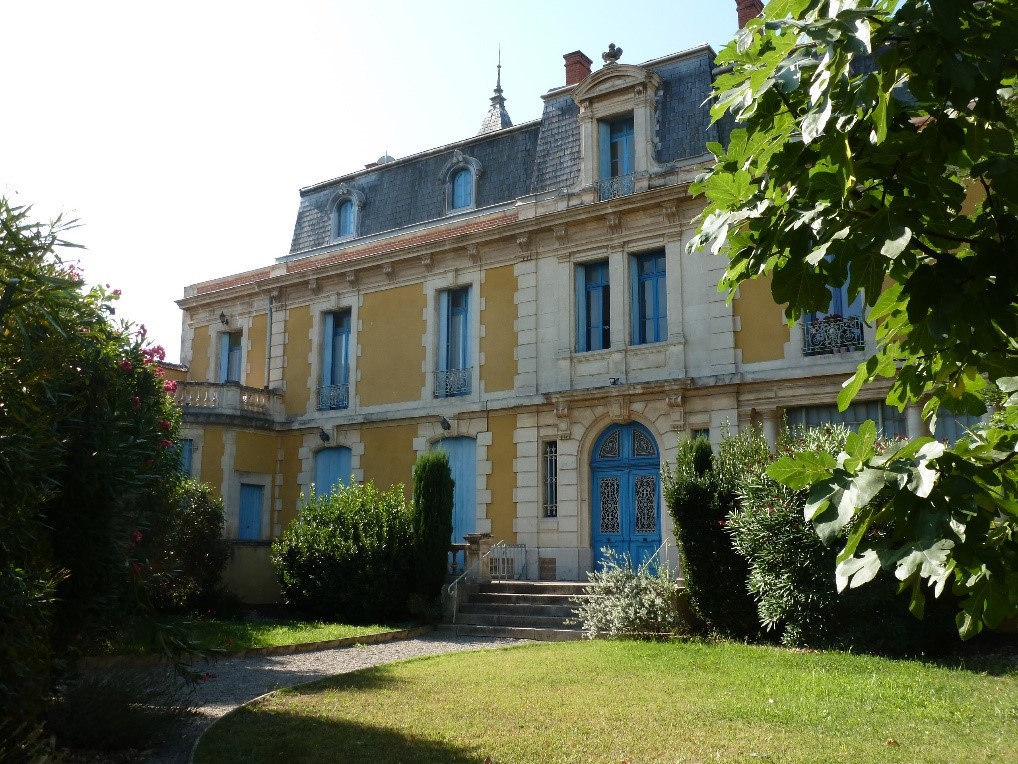
- €110,000 ($132,529): A two-bedroom apartment in a 19th-century château, with a garden, in a market town in the Minervois wine region. You’re private apartment is served by a grand entrance hall, and an impressive curving marble stair. It comes with two large glazed double doors leading to the stone balcony, a red marble fireplace, cornices... You also have access to a shared garden. The château is in the centre of Olonzac with its shops, market, restaurants, and cafes. The beaches of the Mediterranean are just 40 minutes away and the nearby cities of Beziers and Carcassonne have airports with regular international flights. See the listing here.
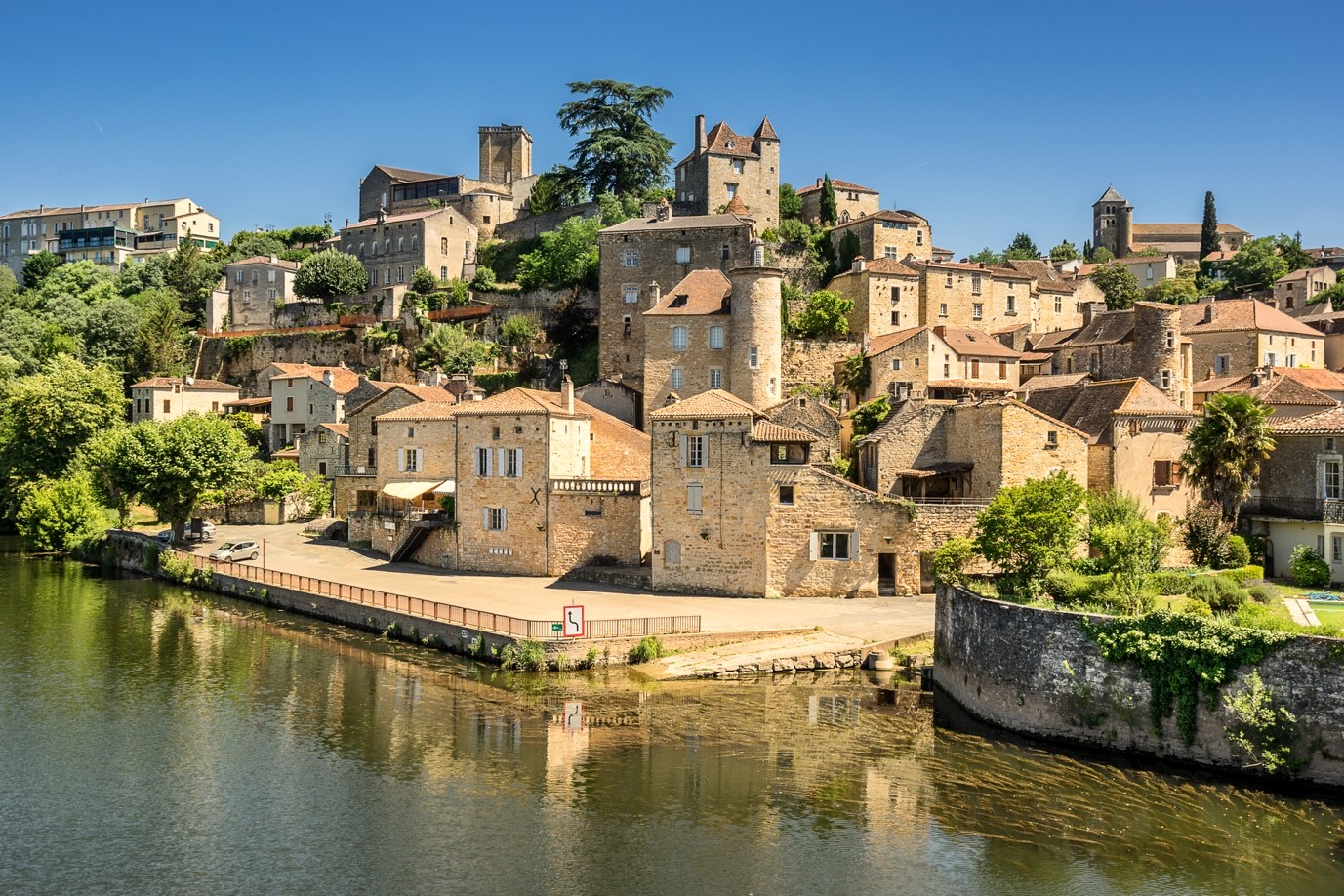
Mountains and Beaches in Ecuador
It was in the Andes of Ecuador where I bought a mountain-view condo for just $40,000 in 2008. I love Ecuador, it's a stunning country with mighty mountain ranges, tropical rainforests, mirror-smooth crater lakes and smoking volcanoes. It's got hundreds of miles of unspoiled Pacific beaches, vibrant colonial towns and a culturally rich capital city.
It's a hit with foreign retirees but it's also popular with young surfers. It's a low-cost destination for travelers and one where expats can afford to live the good life...
The real estate market is driven by locals...and Ecuadoreans living overseas in places like Spain and North America. They often invest in Ecuador, buying a second home or future retirement home. There are foreign buyers, but they're a tiny percentage of the overall market. That's one reason why real estate prices have stayed low here, unlike many countries in the region where prices rocketed after a surge of foreign buyers piled into the market.
One benefit of buying a home in Ecuador is that a relatively low investment (around $40,000 at time of writing) can get you a residence visa...so you can stay in country as long as you like.
Property prices are still affordable in many parts of Ecuador. So, if you're dreaming of a home in the coffee-growing highlands...a getaway in hummingbird-filled cloud forests...or a beach condo steps to the sand...I have some to get you started with your search...
As I mentioned earlier, in 2008, I bought a little bolt-hole in the town of Cotacachi. Two hours north of Quito, and 8,000 feet above sea level, Cotacachi is a charming village. Traditionally a leather-making town, and a center for growing roses, it's slow and sleepy.
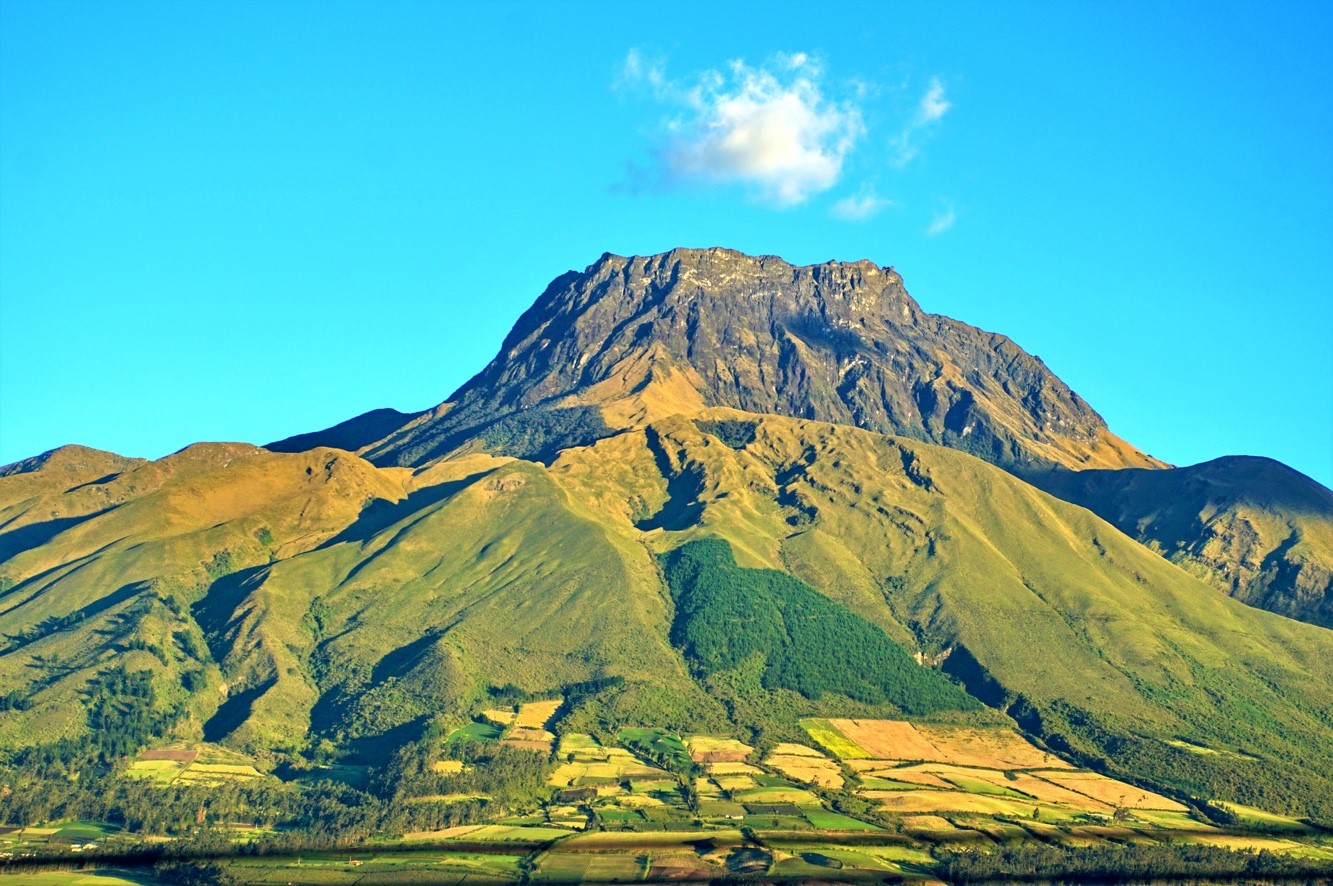
Cobbled streets radiate out from the tiny central plaza...a volcanic peak provides a dramatic backdrop. There are local spots where you can get lunch for a few bucks. Or, you can splurge on the award-winning La Mirage where guests include visiting royalty. Ibarra, a large town close by, has big-box stores and large supermarkets. The town of Otovalo, 20 minutes away, has one of the biggest markets in Ecuador, selling everything from textiles to spices.

Here's some enticing examples of how far your money can go...
- $99,000: A large two-bed, one-bath apartment in the center of Cotacachi is currently on the market. It comes with garden, greenbelt, and mountain views, and a living space of 1,431 square feet. See the listing here.
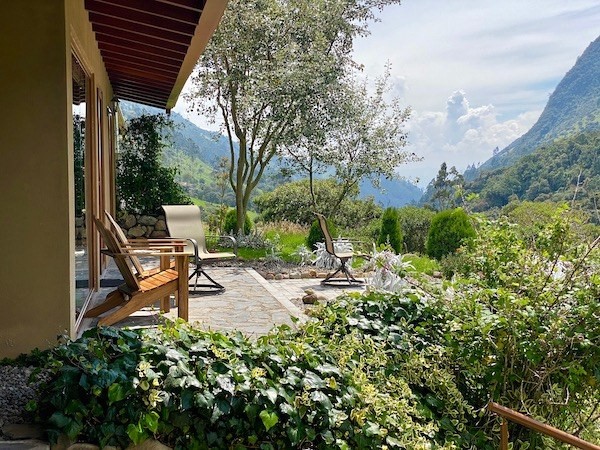
- $139,500: A secluded one-bedroom turnkey condo with spectacular views is located on the rim of El Cajas—a UNESCO World Heritage Biosphere Reserve and pristine national park just 20 minutes from Cuenca. This is the last residential property built in the El Cajas region due to UNESCO restrictions, so it’s truly the last of its kind. Walking paths to the river and mountain areas surround the property making it an ideal home of anyone who loves the great outdoors. See the listing here.
- $48,000: A spacious one-bed one-bath apartment with a large outside terrace. The terrace has lovely mountain views. The apartment is being sold furnished. See listing here.
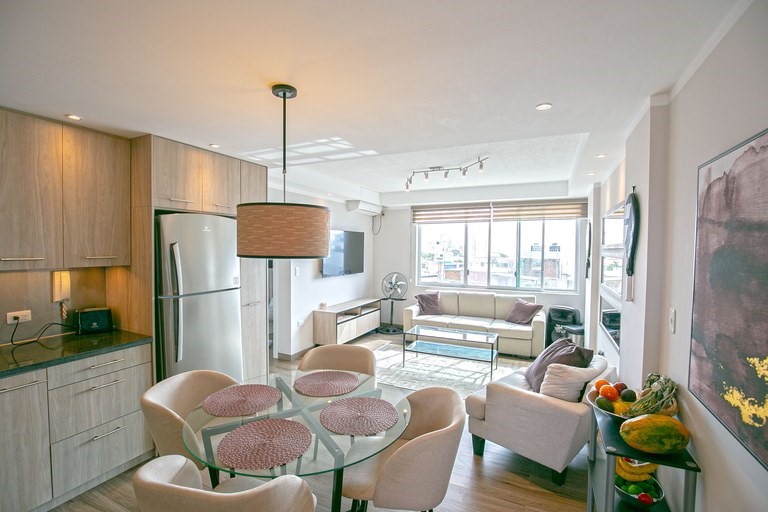
- $69,500: This newly-remodelled, one-bed condo in the city of Manta is just steps for the beach and walkable to the cities main shopping plazas. The condo comes fully furnished, including appliances, refrigerator, washer, and television. For a 650 square foot condo, the price here is incredible. See the listing here.
On Ecuador's Pacific coast, the town of Salinas has long been a magnet for well-heeled Ecuadoreans at vacation time. In the school summer holidays, families move into their second home in Salinas and activity in town kicks up a notch.
They've been joined in recent years by North Americans, looking for an affordable beach destination.
Salinas has a nice malecon (boardwalk) and two beaches. One beach is lively, close to restaurants, cafes and bars. The other is a wide, quiet sweep of sand, popular with families. These beaches get busy at weekends and vacations. But a short drive outside the city you'll find long stretches of unspoiled beach and secluded coves without the crowds.
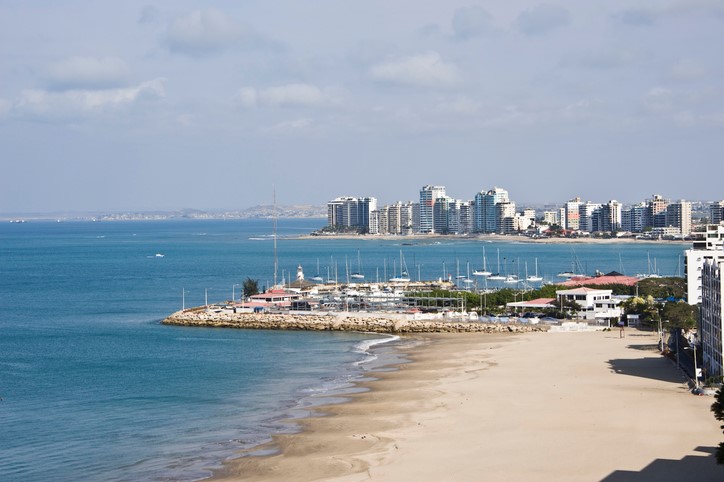
Salinas isn't a vacation spot that becomes a ghost town out of season, however. Its year-round population, taking in neighboring areas like La Libertad, is around 200,000. It's got plenty of restaurants, cafes and ice cream parlors. It's got a buzzing nightlife with bars, clubs and live music joints. It's a hot spot for sport fishing and sailing with two yacht clubs. Plus, you'll find supermarkets, clinics, hardware stores, banks, beauty salons, a huge produce and seafood market and a movie theater.
This is an example of what you can buy in Salinas...
- $85,000: Panoramic views of the San Lorenzo beach area, from a two-bed, two-bath condo with breakfast bar and living/dining room area. The community also includes a swimming pool and jacuzzi and private beach. See listing here.
White Sand Beaches in the Dominican Republic
The Dominican Republic offers powder beaches and crystalline Caribbean Sea. The landscape includes waterfalls, mountains, valleys, forest, and lakes.
It's a country of firsts: the Caribbean's highest peak, Pico Duarte...the Caribbean's largest lake...it's home to the first cathedral, castle, monastery, and fortress built in the Americas...it's also the first seat of Spanish colonial rule in the New World. Moreover, it's the most visited destination in the Caribbean.
Tourism is one of the factors fueling growth in the Dominican Republic. The country has a warm climate all year, beautiful beaches, national parks and historic sites. Upscale resorts bring in visitors from North America, Latin America and Europe. They offer lots of amenities like golf courses, fine dining and marinas. There's even a replica of a 16th century Italian hilltop village inside one, with artists' studios, boutique stores and an amphitheater.
But my top spot in the Dominican Republic is far removed from cookie-cutter hotels and extravagant resorts. It's the little town of Las Terrenas, on the Samana peninsula.
It's low rise and low key. Thirty years ago, Las Terrenas was a rustic fishing village. The town didn't have an electricity supply until the 1990s. But it attracted thousands of French and Italians who came as tourists, fell in love with the town, and started businesses: Restaurants, cafes, bakeries, art galleries, small hotels...
The old wooden fishermen's huts sitting on the beach are now trendy cafes and restaurants. They serve wood-fired pizza and simple snacks, right up to gourmet Italian and French food. You can dine on a covered outdoor deck on the sand, with good food and fine wine, soft music, and the ocean a few steps away.

This is one location where you can make good rental income when you're not staying in your home. There's good demand for decent accommodation, especially downtown where you can walk to the beach, dining and entertainment.
- $76,000: This two-bed townhouse is in the heart of the beach town of Las Terrenas. It comprises a kitchen, living room, and a mezzanine level which is the second bedroom. There’s an outdoor patio perfect for dining al fresco and which overlooks the shared tropical garden and swimming pool and Jacuzzi. The perfect place to come to escape the winter blues! See listing here.
- $79,500: A small one-bed condo, 350 feet to the beach and close to restaurants and cafés. The complex features a swimming pool and tropical gardens. The condo comes furnished. See listing here.
- $100,000: A one-bed one-bath condo in a small community with spa and wellness, and a swimming pool. The condo is sold fully furnished and equipped. It's 5 minutes to downtown close to a pretty cove and beach. See listing here.
Tropical Costa Rica
Ask anyone who's ever visited Costa Rica what they think of it—and most will tell you it was love at first sight.
I've lost track of the number of people I've met who bought property in Costa Rica in their 50s and 60s...based on fond memories of surf trips and wildlife adventures when they were decades younger.
They might have traveled with little comfort in their younger years, roughing it in cheap hostels and beat-up buses...but when it comes to a second home in the country, their older, more experienced, and better-heeled selves often want a touch of luxury.
Costa Rica is a safe, stable country. It's got no army, no beef with anyone, and a very friendly welcome for tourists and expats alike.
Its biggest treasure is its natural beauty. From unspoiled beaches to smoldering volcanoes...tranquil lakes to crashing waterfalls...thousands of acres of rainforest and cloud forest...there's beauty almost everywhere you look.
It's the kind of place for those that love the outdoors. If your yen is tracking rare tapirs...zip-lining through the jungle canopy...sea kayaking and whale watching...hiking, biking or horseback riding...Costa Rica has it covered.
If you're dreaming of a bolt hole where you can escape for vacations with family and friends; a retreat where you can ride out the cold winters back home; or your goal is a second home that can deliver good returns—you'll find it in Costa Rica.

One spot that's gotten my attention is Arenal. It's home to a 33-square-mile lake, surrounded by hills and forest and volcanic peaks. It's a gorgeous part of Costa Rica, but one that's been overlooked and is therefore undervalued.
The biggest towns on the west side of the lake are Nuevo Arenal and Tilarán. Nuevo Arenal has a bank, grocery stores, a clinic, gas station, bars and cafes. The famous German bakery is a good spot for lunch, serving bratwurst, sandwiches, fresh pretzels, and apple strudel.
Dotted around the lakeshore road, you'll see little hand-painted signs for eateries. You can eat New York steak, local-style rice and beans, barbeque chicken, pizza, home-made pasta, burritos...or just stop for a rich Costa Rican coffee with a macadamia-nut muffin, warm from the oven.
During the day, residents often enjoy fishing in the lake, horseback riding, gardening, or hiking in the forest. With the constant spring-like climate, it's comfortable to be active and outdoors any time of year. There's a small but active group of long-term expats who often meet for drinks or to share a pot-luck dinner.
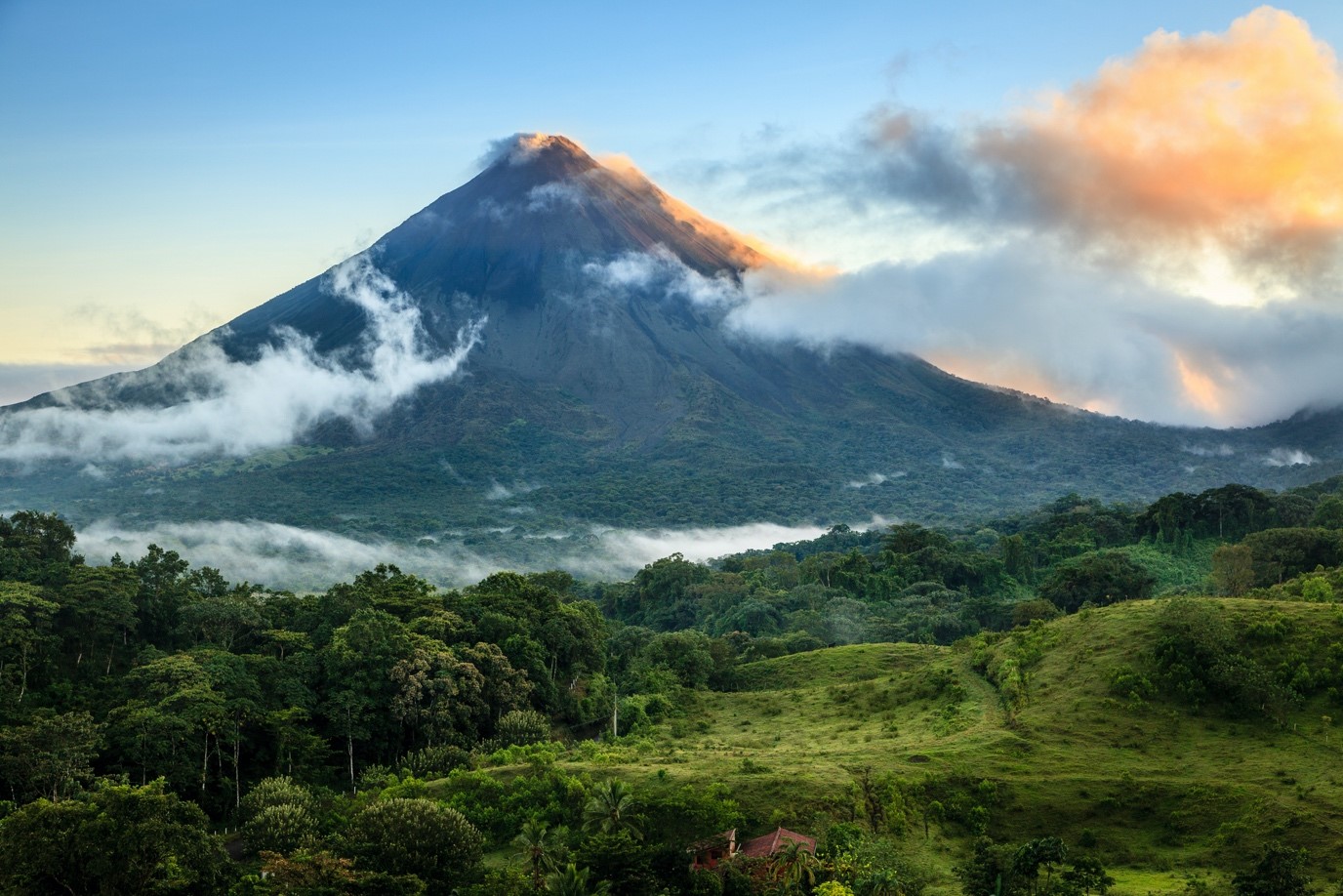
- $110,000: A one-bed two-bath home, with 1,237 square feet, wood floors and a lake-view terrace. It's on a 0.6-acre lot. See the listing here.
- $89,000: This one-bed casita in Guanacaste is just five minutes from the beach on Costa Rica’s northern Pacific coast. It comes fully furnished and so is ready to move into. You could use it as a full-time home or as a vacation getaway pad. There’s a small kitchen and living area and outside a porch runs around two sides of the house and overlooks the garden. There is also a storage shed. The development has a tennis court and is just a few minutes from shops and restaurants. See the listing here.
Take Your Next Step...
The world is big...once you start casting your net out for dream homes you realize your biggest challenge is narrowing down your search...
That's why establishing your personal criteria is so helpful. And you can get started right this instant.
With a pen and paper, or just take notes into your phone or computer...
I'm going to help you profile yourself....
This is fun, it's pretty easy, and it is the very first thing I recommend you do if you're serious about buying an overseas dream home.
Be clear from the start what you want to get out of the property—and how much you are willing to put in. You need to decide if you are purchasing as an investment or buying a second home...
Start with simple stuff...
- Write down your reasons for buying an overseas dream home
- What countries or destinations are you especially interested in?
- What weather do you like?
- Are you going to be living there full-time or part-time?
- What amenities and activities do you like?
- Do you want to be close to a beach, a lake...or up in the mountains or close to a city?
- Do you want land with your property...if so, what do you plan to do with it? Some chickens and a donkey or a lavish landscaped garden?
- How big a property do you want? Are you going to have a lot of visitors for instance.
- How important is it to be close to an airport for travel?
Be really honest with this next one. Be ruthless...
- How much work are you prepared to put into the property? How much time have you got to do so? E.g. Do you want to simply drop a bag and say "I'm home!" Or, are you up for the adventure of renovation? (I could write entire guides to renovation for each country I've spent time in...the kind of thing you find in my e-letter, Your Overseas Dream Home.)
Okay. So, with just those few questions answered, you should be on your way to narrowing down a shortlist of destinations and a type of cheap dream home to look for.
Now let's dig a little into the investment side.
- What's your budget?
- How do you intend to finance the property?
- What are the needs of your existing portfolio (real estate, stocks, bonds, etc.)?
- What's your level of experience in the market?
- Do you want to generate an income from the property?
- If you answered yes to that last question, how hands on can you be with the management and marketing the property as a rental?
- What's your tolerance for risk?
If you are buying purely for investment, your real estate choices should depend on your financial objectives, your existing portfolio, your tolerance for risk, and simply the reasons you're in the game.
I'm guessing you're not buying for investment.
In the end though, the type of investor you are will go a long way toward determining the type of properties you look at, and the type of property you'll buy.
The fact that I'm willing to put my money into Portugal, Mexico, Ireland, Panama, Brazil, and other far-flung places sometimes gives people the impression I'm extremely adventurous.

Truth be told, I am a very conservative investor. I don't like taking risks with my money, I dislike gambling, I don't indulge in speculation of any kind.
In fact, one of the things I love most about international real estate is it diversifies my money. It's not all in one basket. I'm not reliant on the vagaries of the stock market. In fact, I don't invest in stock at all, and I have a choice of retreats in stunning locations around the world.
Real estate is the original tangible and real asset. Unlike any paper investments, or dare I say precious metals, I can use my property.
Years ago, I vowed never again to face into snow, ice, or freezing rain, or oppressive heat and humidity.
I promised myself a life of travel punctuated with enjoyable stays in properties I owned, doing things I loved.
I promised myself perfect weather and a strong income from each property I owned. Often using it when the bulk of people don't want to be there. I like the quiet...and I avoid the crowds. But, crowds means renters so by following this strategy I also make the most of peak rental season.
I spend winters in Cabo on the tip of Mexico's Baja Peninsula. I have an ocean-view, access to a world-class golf course, and the weather is ideal.
My Cabo base meets all my criteria for a part-time base. I spent time refining these and here they are:
- Perfect weather for when I want to be there—no heating nor air-con needed.
- Golf close by and accessible, affordable public courses.
- Near, or close to, the water
- Close to an airport
- Income producing
- Relatively hassle free
- Quiet and serene but with good food and a vibrant town accessible
I've been visiting Portugal's Algarve since 2002. It gets 300 days of sunshine a year, stunning beaches, delicious food, world-class golf and it's rich in culture. It also has a red-hot peak rental season in the summer, a season that's getting longer as tourism in Portugal booms.
I recently applied for Portugal's Non-Habitual Resident Tax scheme and successfully got the status a couple of months ago. This NHR is one of the smart things Portugal is doing to attract mobile international people, along with the Golden Visa. The country has done other smart stuff including the abolition of rent controls and I am impressed on every visit with the optimism and sense of progress I encounter there.
I've found opportunities in the cities of Porto and Coimbra, but I am looking for a villa on the Algarve rent in the summer when I don't want to be there. Something I'll have forever and use at the tail ends of the off season.
I had looked in Italy but it doesn't connect well to my hometown of Cork, Ireland, where my family live. I like to be able to get home easily when I'm in Europe and though I love Italy for vacation I don't have the same draw to live there, for one thing there's a lot less golf.
Spain was a close contender but I feel the Algarve is a quieter calmer option...less bling...more for me.
Another place high on my short list was France's southern Languedoc region because it satisfied most of my criteria and I heard of British expats selling up in the wake of Brexit meaning we can potentially find motivated sellers. The Languedoc gets about 300 days of sunshine a year.
But in the end the Algarve won because of the benefits of Portugal's NHR for me, better flight connectivity to Cork, and better weather either end of the off season.
I've used myself and my criteria here as an example but we're all different...
So, start with your personal criteria and be true to them.
Home in on a region you like. Apply your criteria...what climate do you want? What about the culture, the food, and things to do? Do you need to be close to a city, an airport...
How will you use the property? Is it a part-time base for a few months a year...do you want to make it a primary base, have a large garden, some land for animals...will you have a lot of visitors from back home...
How much work are you willing to take on? Does the property need to be turn-key, do you drop your bags at the door and start enjoying yourself? Or are you up for the adventure of renovation...bringing life back to a centuries old stone home and making it your own.
If you're looking to make some rental income that's a whole other thing, that requires you to put your investor's hat on and analyze the property accordingly.
If you find a property that meets your criteria I say pull the trigger. Just make sure you have your criteria nailed down. Don't be hesitant, nor fearful and don't be greedy.
When you've found what you're looking for, don't hang about...make your dream happen.
My Top Tips for Finding a Dream Home
"You want to go where?!"
I've gotten used to hearing this from lots of different people on the road: taxi drivers, concierges, brokers, and even local contacts.
When I first went to Panama in 2004 to invest in real estate my family thought I was nuts. That's still a reaction I get a lot—especially when I tell someone I want to travel to a spot far beyond where a road runs out...over mountains...down dirt roads...or anywhere else far off the beaten track.
Frankly, I don't care what they think. Actually, it suits me that people think I'm nuts to want to travel where I travel. It means that there are far fewer people sniffing out opportunity that's often just a short (albeit uncomfortable) journey away from where they're focused. I get to see places before they really take off...and find incredible real estate.
That's brought me to some far-flung places—thick jungle through which you have to clear a path with a machete in Mexico...overgrown and unfinished developments on Spain's Costa del Sol...the mountains of Thailand...helicopter rides to unspoiled beaches in Panama...cobbled lanes and historic towns of Greece, Slovenia...and more besides.
But I bring it up because no matter what opportunity you hear or read about, you should check it out in person. That's my number one recommendation, because I know from experience how important it is to put boots on the ground.

You don't need a whole lot of time. With just your weekends and vacation days you can plan and organize focused scouting trips to check out cheap dream homes in your shortlist of destinations. Planning ahead is key.
Read and research. Check out YouTube videos, tourism guides, the Global Property Guide is a worthwhile online resource with market overviews from all over. Look for news articles...listen to podcasts. You're trying to get a rounded picture of the place, and an informed sense of the real estate market.
When you first do an online search for a property in a country you often find aggregator websites. Dig deeper to find the original listing and the contact details of the particular real estate agent. Reach out, explain what you are looking for and arrange to spend time with them on the ground. Do this with several, don't stick to one broker. You want a complete picture.
Apps and online booking have made travel so much easier. Where possible I stay in Airbnbs. It's a good way to get a sense of the neighborhood or region from the point of view of living there. It also gives you an idea of the short-term rental market...should you be interested in generating an income. Spend as much time as you can on the ground, talk to as many people as possible...
Because some of the best bargains you will ever find are never even listed...
I have a long-standing friend with a passion for real estate. My friend is pretty adventurous. When he retired he took off from the comfort of home in the United States. He's traveled and lived throughout Latin America. He's very fond of talking to doormen and taxi drivers to get the low down. He'll ask a building concierge if they know if there's any apartments for sale in the building.
In many historic little towns and villages throughout Europe you'll see for sale signs as you walk around but check online and you'll find there's no listing. This is a case of getting your phone out and calling the number on the sign...you have nothing to lose and potentially a lot to gain.
The bottom line, there is no substitute for seeing things in person and spending time in a place.
The Strolling Strategy: A love of travel and your smartphone can lead you to the bargain of a lifetime and be a whole lot of fun. When your boots are on the ground in Europe you can employ what I call "the strolling strategy."
This works extremely well in Italy, Spain and Portugal. But you can do it in other countries too, it all depends on the app. For instance, Idealista is a listings site with a great app covering the three countries I just mentioned.
Once you have the app downloaded, you boot up, and with your phone in hand take a walk. Every few minutes or so, stop and refresh the app searching "nearby." At the same time as taking in the area and scoping out the neighborhoods, you're also able to see what's available for sale and for how much. (And you're strolling around the backstreets of Venice...or Florence... or any stunning Portuguese, Spanish or Italian town...hardly a chore.
The real beauty of this approach is you get to explore the neighborhood, city, district...at the same time as looking for property.
Size Matters: When scouting in Europe you need to be able to speak metric. Prices are quoted per meter. To get a rough translation for your initial analysis on the fly just remove a zero. For example, €1,000 per square meter is approximately 100 euro per square foot.
How to Haggle in Any Language: Remember, all asking prices are just that...it's what the seller is asking you for. You want to pay less. So, how much will the seller settle for?
Take Europe, where there are beautiful villages and towns with dwindling populations. You can find regions with a glut of stunning old homes on the market and very few buyers.
Migration to the cities is the prime reason. And often locals just prefer to live in a modern apartment then deal with the management of a large rambling house that's centuries old.
Now we have a major crisis. So, there will be more motivated sellers. Cast a wide net and let potential sellers compete for the sale.
This is exactly how I would play it.
And look for places where folks already have second homes. Granted not everyone will be in a rush to sell, but some folks will. You can find turnkey dream homes, no work required, and get a screaming deal.
How do you find out?
Just ask. Let sellers compete for your business.
Find a half dozen properties you like...or more. Show sellers you are serious. Offer them proof of your funds...then offer them what you're willing to pay and see if they bite. Sure, a bunch of sellers will dismiss your offer. But you only need one to offer you the best deal.
Avoid Analysis Paralysis: If you're a fan of spreadsheets and numbers you might be in danger of "analysis paralysis."
You start with good intentions. For every property you look at you input square footage, price, bedrooms, bathrooms, aspect...utilities, projected costs...projected income...
After a while you have an elaborate matrix of data...a comprehensive comparison of all the properties...
This can be useful, but it also paralyzes you, or worse, you can find yourself focusing on the wrong things and going in the wrong direction.
Don't be the spreadsheet person who never pulls the trigger. I like to buy things where I am ahead from the get go. For example, by paying $150,000 for something that's worth more than $200,000. We make our money buying, the old saying goes...and it's never been as accurate a saying as it is today. You can get so caught up in the crunching, you can miss that critical first step...buy really, really well.
Your criteria as outlined above will help. And I personally like to look for real estate deals that are so amazing that even if things go wrong, it's just not that bad.
Find a motivated seller: Asking price is just that. It may be that the seller will take less. You don't need a global crisis to find motivated sellers but it helps and we are in the midst of one right now. There are many reasons a seller could just want out...if you can help them realize a quick sale you might be able to get a great price.
As the current crisis bites you'll find more motivated sellers across the world. Look for places where folks have second homes. (One of my research team just told me he's keenly looking into British expat enclaves in the South of France.) Granted not everyone will be in a rush to sell, but some folks will...
How do you find out?
Just ask. Have proof of your funds and be transparent with the sellers. Some of them will dismiss your offer as lowballing. Others will consider it...let those sellers then compete for your business.
Mistakes to Avoid
As John Travolta famously tells Samuel L. Jackson in the film Pulp Fiction, in Paris a quarter pounder with cheese is called a "royale with cheese."
Whenever you travel, the first thing you'll always notice are the little differences. Kissing on the cheek instead of a handshake...the different foods laid out for breakfast...the different protocols for tipping...
When it comes to overseas real estate, you'll also notice a few differences—some small, some big.
Margaret Summerfield is my senior researcher and for this part of this special report I've asked her to walk you through what to expect...
Over to Margaret...
**********
"And this room is—for what, exactly?"
The answer was a bit of a culture shock.
This was my first scouting trip in Latin America, way back in 2006. I was touring condos and homes. They were spacious with big bedrooms, walk-in closets, and lavish bathrooms. But the first house I saw (which had a master bedroom bigger than my European apartment) came with a little extra...
It was a small bedroom and bathroom right behind the kitchen and laundry room. The bedroom was barely big enough to fit a single bed and a modest wardrobe. The bathroom was also tiny. I was perplexed. What on earth was it for?
Oh, the real estate agent answered, that's the maid's quarters, for your live-in maid.
A live-in maid or nanny, it turns out, is normal for many Latin families. For foreigners, like myself, it's not really the norm. They usually prefer someone who comes in during the day to cook or clean but who doesn't live with them. I've seen North American expats use the maid's quarters as a small home office or simply for storage.
You'll find differences big and small when buying overseas...but one thing is the same: Always do your due diligence when buying any property.
It's easy to fall head over heels for a place and let the romance woo you into hasty decisions. But a good lawyer and proper due diligence are essential no matter how cheap a property is.
There's something about buying a property overseas. It's all so exciting and full of possibilities. It's easy to get caught up in the buying process, and it's very easy to get carried away. Equally you shouldn't be alarmed by how alien and different it can be. You just need to remember that some things stay the same. Don't leave your common sense at home.
To help you do your due diligence, I've compiled the following checklist you should follow with all your overseas property purchases. I've broken it down into a seven-step guide:
- Hire a local attorney
- Check the sale contract
- Check the title deed
- Check permits and approvals
- Check access
- Check infrastructure essentials
- Investigate tax issues and wills
- Use approved escrow services
Step #1: Hire a good, local, in-country attorney: You need an in-country attorney. Your local attorney should work for you—and only for you. He should not represent anyone else in the transaction. That may sound like a given...but in many countries, an attorney can legally represent both sides in a transaction.
Your attorney should be bilingual. It's going to be tricky enough getting to grips with a different buying process. If you can't understand what your attorney is instructing you to do, the whole process could quickly become a nightmare.
You should be aware that while most of the U.S. and Canada use common law, in much of the rest of the world civil law applies. Civil law is very black and white. There's no pleading for fairness...you are either right or wrong. And some legal terms and definitions may sound similar but will mean something very different.
Don't take a seller's word for it: have your attorney check everything that they tell you regarding the property.
Also, have your contract translated and read it carefully yourself. Ask your attorney to explain anything you don't understand. Your attorney may not explain a clause that is normal procedure in his country—but it may be very different to how you'd do things back home.
If you are unsure about how to find a good local attorney, do what you would do back home. Ask friends, family, or colleagues if they have bought property in that country, and if so, which attorney they used. Failing that, First American Title Insurance has a list of approved attorneys they work with in foreign countries. You can ask for their list of approved attorneys in Costa Rica, for example.
Step #2: Check the sale contract: You may get a sale contract or purchase agreement in English—but it's the contract that is in the language of the country that you are buying in, that is legally binding, whether that be Spanish or Portuguese or French. If you have a dispute with the seller, if you need to go to court, then the version in the language of the country will be the one that you use.
Have your attorney translate the sale contract for you and read it yourself. Ask your attorney to explain any clauses or terms that you are not sure of.
Check that the property details, description, and price are correct. Check that the seller's name matches the name on the current title deed.
Your attorney can check that your sale contract/purchase agreement gives you title, free and clear, on closing.
Surprisingly, sometimes the contracts don't. I have seen a few that give you possession of a condo, and the keys, but not the actual registered title...the developer simply stated that he would register it at some point (with an undefined time period).
I've also seen a few that gave title but did not include a mechanism for the seller paying off the mortgage or any other debts tied to your property. For that reason, if a seller has a mortgage or other debts,, check how he proposes to pay it off, and that it's done before title transfers to you. Make sure also that there are no outstanding taxes or liens on the property.
Unfair penalty clauses are an issue with contracts, too. If a seller has clauses stipulating exactly what will happen if you are in default (and applies financial penalties) you should have the same, if the seller is in default.
Step #3: Check the title deed: Your attorney will check the title chain in the registry. In some countries the registry is online, while in others it is a case of leafing through physical documents. Sometimes your attorney will need to use a notary public to check the documents. From that title check, your attorney should be able to tell you the current registered owner and value, the boundaries, previous sales and transfers, whether there are any liens or mortgages or taxes outstanding on the property, and if there are any annotations such as rights of way, etc.
Make sure that your seller is the property owner.
Check if your title is registered or possessory. In some countries, they can seem similar. You can live in a Rights of Possession property, record your claim to it, and you can sell it. There is a difference, however. Registered title, or fee simple, means you own the land. Possession means you have the right to occupy the property, until someone with a better claim to it turns up. You cannot get mortgage financing on a possessory property, either.
Check the title chain. If it includes a co-operativa or confiscation, or was formerly ejido land, your attorney will have to do extra checks to make sure that the title is clear, and all transfers were done correctly.
Beachfront and border properties should be checked carefully. Most overseas countries have a section of the beach related to the high-water mark where you cannot legally own a property. Foreign buyers are usually not allowed to own property that borders a neighboring country, either. The distances for these zones are not standardized but vary from country to country.
In some countries, particularly in Asia, foreigners cannot legally own property outright. There are ways round this...but ask your attorney to investigate thoroughly.
Step #4: Check the permits and approvals: They're becoming more difficult to get, and more expensive. There's quite a range of them, and they vary from country to country. The standard ones are environmental, water, construction, and municipal permits.
Have your in-country attorney check to make sure that your seller/developer has all the permits and approvals he needs to comply with current regulations.
You could say that you are happy to wait for one last permit to be granted to a developer or seller—but make sure that your money is escrowed if so.
In some countries, you can see houses for sale that have either never applied for planning approval, or had initial approval but subsequently added an extra unapproved bedroom, or garage. This is particularly true in rural areas. Sometimes you only need to pay a fine or tax to get retrospective approval. Have your attorney check for you, and ideally get the seller to legalize the property before you buy it.
Step #5: Check access: How do you get to your property? If it is via a right-of-way through someone else's property, that needs to be stated in the deed. Similarly, has anyone else got rights of way through your property? Both of these scenarios can be checked by your attorney.
Step #6: Check infrastructure essentials: These are the services that you can't live without, and you should ask the seller as many questions as you need to ask to feel comfortable before proceeding with the sale.
Water:
- Is there a source of potable water on the property?
- What's the water pressure?
- What's the purity?
- If there isn't a mains supply, who will drill a well? If it is you, how deep will you have to drill—and how much will that cost?
- How is waste treatment being handled? And does it comply with local regulations?
- Will there be a municipal system, a system put in place by the developer, or will you need to put in a septic tank?
- If a septic tank needs to be installed, check local regulations to see how much you will have to spend (some environmentally-sensitive areas require a very high-tech, and very expensive, tank).
Electricity:
- Is it in place...if not, what timeframe (and cost) are you looking at?
- Will it be aboveground or underground?
- What type of supply is it— for a hotel say or small business you may need three phase, what is the voltage/plug used, etc.?
Roads:
- Are roads and pavements already in place?
- If not, when will they be...and what standard will they be?
- If high-speed Internet is an absolute necessity for your job or your business, check that it is available in your area (preferably with a service provider). Ask what the speed is in MB (megabytes). High speed or broadband Internet in some countries I have visited is snail's speed.
Step #7: Investigate tax issues and wills: Discuss with your attorney the best way to hold your property overseas. Whether you hold the property in the name of an individual or a corporation, for example, is dictated by your personal circumstances and what your plans are for the property...do you want to hold it long-term, sell it before completion, or use it for rental income?
Ask what happens if you die (not a pleasant subject, I know, but it needs to be broached). You may need to have two wills, one in the country you are buying in, and one back home. If you are a couple, how would the death of one partner affect the property ownership?
Step #8: Use approved escrow services: You are almost at the end of the checklist, and probably ready to start making payments to the seller. We advise that you use escrow services at that stage, and we mean approved escrow services, such as those offered by First American Title Insurance. Developers and attorneys will have escrow accounts, but they are often no more than a separate bank account in the developer's or attorney's name.
Finally, remember that buying a property overseas is exciting, and potentially one of the most profitable investments you can make. You just need to do your homework, and make sure it's the best possible deal for you.
Making an Income from Your Property
Controlling my stress levels matters to me a lot. Owning income-producing real estate helps enormously.
I believe owning income-producing property is the perfect path to freedom, both financial and personal.
The freedom to go where you want, when you want. Freedom from worry and stress...to not to care what happens in the stock market...nor about job losses...nor politics...
With the right real estate, you can create a life of ease, travel, fun, and adventure for yourself.
Fortunately, it is easier today than at any other time in history for small investors, like us, to make strong gains from renting our real estate out, particularly short term.
You just need to get the basics right—buying the right real estate in the right market at the right price. Then, you need to spend time growing your customer base and boosting your occupancy to bump up your returns.
Get it right and your rental can be a license to print money.
The worldwide vacation rentals industry has exploded and is expected to grow 30% over the next seven years.
Of course, right now, due to the COVID-19 crisis, the industry is taking a hit. The hiatus on tourism and travel has caused vacation rental booking to tank across the world. But I'm not worried...
In fact, I see this as an incredible opportunity...
With the right real estate, in the right place, you can set yourself up with an income for years to come...bolstering your savings and giving you a life of travel and ease.
Buy now, while crisis deals are on the table and we can lock down real estate at a discount, setting ourselves up for exceptional yields once the world starts to recover.
And it will recover...
The fact is, for decades before this crisis, global tourism has been booming. In 1950 there were 25 million international tourist visits, rising to 166 million in 1970, and 435 million in 1990.
In 2019, there were a record 1.5 billion international tourist arrivals, a rise of 4% over 2018. According to the United Nations World Tourism Organization this represents 10 consecutive year of growth.

It's easy to forget that before the COVID-19 crisis, the number of tourists worldwide was at record highs. The world's most popular sites and cities were swamped and struggling to cope with the hordes of vacationers.
It may take a while to rebound to those levels again, but people have always traveled and always will.
And when it does rebound, it will be boosted by another accelerating trend...
In February, if you had suggested to every CEO, government department, school, and university they send everyone to work from home you would have been considered crazy.
Now, it seems the entire world is downloading online communications software like Zoom and managing their lives online. The CEO of Twitter has gone so far as to announce that many of their employees will be free to work remotely "forever."
Remote working was already a fast-growing phenomenon. According to a study by Global Workplace Analytics in one year (from 2016 to 2017), remote work grew 7.9% in the U.S. Over the last five years, it grew 44% and over the previous 10 years, it grew 91%.
But now, because of COVID-19, remote working has gone mainstream. And its effect will be profound.
Vast numbers of employees are now asking themselves why would they go back to the commute and the office...why not do their work from a Caribbean beach town or a hilltop town in Europe with lower costs of living and better weather...
They'll be looking to Airbnb, VRBO, and other vacation rental platforms for options...and renting what we can offer them.
In the right places, renters are going to surge back after this crisis. And for those of us looking to generate rental income from our overseas real estate, there's a lot to look forward to.
The most important thing, buy the right property in the right location, and do it at the lowest possible price.
The key is to find an attractive destination that vacationers can easily get to from as many locations as possible.
Upfront, I'll tell you frankly that I've rarely come across real estate priced under $100,000 that could generate a truly awesome income, but if you up your budget just a little you are in the "profit zone" in a big way.
Let me give you two examples of stunning real estate that could set you up for a handsome income.
Making Even More Income from Your Property
As you know by now, a key part of my personal strategy is to create a portfolio of income-earning properties. It's the path to more freedom, both financial and personal. That's my firm belief and my first-hand experience.
But I'm not going to tell you it's as simple as buying a place and sticking an advert on Airbnb.
Granted, it's easier than ever before to manage a rental overseas. The internet plays its part...plus you'll find good property managers in many locations. To be frank, do it right and it could be much easier to rent a place overseas than renting out an apartment down the road or the house next door.
But if you're serious about an income then your property is a product. And you need to treat it like one.
It's competitive out there. Winner takes all. Identifying the right destination to earn a strong rental income is an important part of the equation, but it's not the only one. It's the first step.

The next step is to maximize your return.
Approach your rental strategy in the wrong way, and you'll leave money on the table...
Follow some simple, tried-and-tested steps, and you stand to double or even triple your rental yield.
I can't begin to tell you how many good rental properties go overlooked because the owner hasn't advertised it properly. Say you've got a luxury condo that's a few steps from a beautiful beach and a stroll to a gourmet restaurant. It's in a community with top-notch amenities and amazing views. How well do you think it would rent if you use a photo of an overgrown field to advertise it?
A picture is worth a thousand words. Choosing the wrong photos can actually put off prospective renters. Your home is only as good as the photos you show of it. Get some help taking the photos if you need it...and use your best photo as your "profile" photo. It's the first thing folks will see when they search.
Bad lighting, weird camera angles, and photos of dark corners won't help. Make sure your home looks its best. Stage it as if you're selling it to a prospective buyer. Declutter it and remove any personal items you've scattered around. Make it look warm and inviting. If you've got outside entertaining space, show it off. If you're close to a beach, post some nice beach shots.
If you're planning on renting short term, I recommend you use all the established vacation rental-by-owner websites. There are several of these: VRBO, FlipKey, and Airbnb are among the most established. Use them all of maximum exposure. If you plan to rent your property longer term, you should check out the most established websites for long-term rentals in your particular destination. And work with local real estate agents and property management companies.
Generally, short-term rental sites take a percentage of what you charge your renters as payment for using their service. That's a fee you wouldn't pay if you were to advertise on your own personal website. But there are advantages to using these services that make it worthwhile for a lot of vacation rental owners.
The biggest advantage to sites like these is visibility for your rental property. The big names in the business spend a lot of time and money making sure they come out on top when someone searches online for rental property. That means more traffic on their site—and more potential renters for your property. In turn, it means you won't have to fight to have your property seen by online searchers.
The well-known brands are trusted by renters, too. That's another advantage to using them. Some of them operate a full-refund policy to renters if things go wrong. That helps potential renters feel more secure. It also pushes them from simply browsing to making a booking.
Come up with a catchy one-line title that makes your home. stand out ("Luxury Condo by the Beach and Close to 5-Star Restaurants," for example). It should sound compelling enough to make people want to click on it and find out more.
You'll also need a good description of your home. Bigger vacation-rental-by-owner sites will give tips on what's expected as standard in a property, down to the number and type of towels in each bathroom.
List what rooms you have and what furniture and appliances you've got, down to the type of bed and how many place settings you're offering.
Describe the area around your home—the amenities and attractions nearby. State how close they are to your home. Mention a few good places to eat and shop; give the names of the eateries and the type of food they serve. Most importantly, paint a picture of the dreamy vacation your guests can enjoy.
Think about what your renters want. A little tactical thinking will go a long way. A contact who has properties in Medellín, Colombia, told me he's fitted all his rental properties with air-conditioning—even though the climate is so temperate air-conditioning is rarely needed. His reasoning? Most North American renters will automatically tick "air-conditioning" when searching for a place, even when it's not needed. By including that one amenity, he ensures he's visible to a bigger pool of renters than his competitors who don't offer air-conditioning.
Keep an eye on peak seasons and events to get the best price for your place. Adjust your rate seasonally—or to reflect local events such as film or jazz festivals, when demand is higher. You may want to set a minimum stay period in peak season, or to fit with local short-term rental restrictions.

The currency you charge in is important. If most of your overhead is in dollars, it seems obvious to post a nightly or weekly rate in dollars. But if your potential renters are mostly local, and dollars aren't widely available, it's another hurdle that potential renters may not want to cross.
Crucial: Get good reviews. Many folks won't rent a property if it doesn't already have reviews. If your renters enjoy their stay in your home, they usually won't mind posting a review to your site.
I'd suggest going above and beyond with stuff like coffee, water and goodies (fruit, chips, sweets). Allocate 5% of your income to goodies like this. You'll get it back with great reviews that will push your ranking higher and higher.
Whether you're using a brand-name site or managing your own website, renters should get an easy one-step booking and payment process. Most folks are time pressured these days. The quicker and easier the booking process, the better. Bigger sites allow renters to book and pay on the spot using a credit card.
As an owner, you should explain your cancellation policy clearly, and make it available to renters before they book or pay. You should also give renters a copy of your rental rules.
Researching the competition is key to making sure you stand out. Look at your competition to make sure your pricing is right. See what they're doing—and make sure you're matching (if not beating) that.
Say you're renting short-term at $150 a night, and so is your neighbor. But your neighbor's identical home is kitted out with A/C, a washer/dryer, and free Wi-Fi, and yours isn't. In that case, you'll either have to match those amenities or cut your rate.
Lastly, customer service is key. Follow up with potential renters as quickly as possible. If they email, respond promptly and give them all the details they need. Give your phone number and let them know they can call you if they have any further questions.
Note: I haven't discussed the pros and cons of a property manager and how to make sure you get a good one that knows their business and maximizes your yield...there's a lot to it—and a whole other story...it's something I get into from time to time in my e-letter Your Overseas Dream Home.
The Miracle of Leverage:
Financing Your Overseas Dream Home
Leverage is pretty simple. You use borrowed money to buy a property and, by doing so, you can increase your returns.
I get a lot of questions about financing overseas real estate. I usually start by saying there are more ways to finance your overseas real estate investment or second home than you might think...
Most folks know about getting a line of credit at home against your property or other asset.
And I know of folks who have used a self-directed IRA, something I'll deal with in detail at another time.
For my Real Estate Trend Alert group I often manage to negotiate developer financing.
But let's focus on borrowing from banks in Europe...
Because there has never been a better time to borrow money in Europe.
In July 2009 Sweden's central bank cut its deposit rate to minus 0.25% overnight.
That's right...they started charging to hold funds on deposit.
It was to be a short-lived desperate policy response to the financial crisis. The idea was to encourage banks to lend more. And to create a system-wide disincentive to sit on cash.
The European Central Bank (ECB) soon followed.
Now, more than a decade on, we are in an entrenched period of negative rates in Europe. (And it's a hot topic of debate in the U.S. as rates fall.)
For example, in Portugal, North Americans can borrow up to 80% loan-to-value on a property at rates of less than 1% in some cases.
The ECB is offering us almost free money...and we can use this to supercharge our returns.
I'm personally interested in using this play in Portugal. Right now, banks there are offering really low rates.
I'm looking at buying a villa in the central Algarve, somewhere I'll rent out for the peak season when the Algarve is hot and busy and enjoy in the spring and fall.
My contact on the ground is a good example of how you can use leverage to super-charge your gains.
In 2017, an Englishman, found an old and unloved villa of around 5,000 square feet. He borrowed 90% of this €420,000 property, so he paid €42,000 down, with repayments of just €830 a month.
After he refurbished the villa for €185,000, it threw off €30,000 in rental income while he and his family traveled and vacationed abroad during his kids summer holidays. (Something he does every summer during that red-hot rental season.)
The villa's value is now likely €1.2 to €1.5 million.
Now he is selling this house and is set to buy two derelict houses to repeat the same play.
As I write this report, My contact is in the process of buying two homes for €600,000. He figures he'll need €250,000 to €350,000 to renovate. He plans to move into one and rent out the other.
But get this, his mortgage is just €800 a month, and he figures the house he rents will bring in about €4,000 a week in high season, €1,200 a week in low season.
I absolutely love this play. And it's perfect for anyone who plans to live in the Algarve for just part of the year. With one good rental, you can create some impressive rental yields during the 10 weeks from late June to August. Then you're in positive cash flow and you can use the place yourself the rest of the year or continue to rent it out if you like.
Now, apply this play to a truly cheap home and you get to own a stunning historic home for just a few hundred bucks a month.
The typical French mortgage allows a buyer to borrow between 70% to 80% of a property's value, though some French mortgage brokers limit themselves to only 50% for non-European Union buyers. UK and other EU residents/taxpayers may be able to borrow up to 85%.
Strict Banque de France lending laws state that your total debt (including rents, mortgages, and other regular expenses) cannot exceed more than one-third of your total income. If you are aged over 65, the banks will not include earned income; only passive income or retirement benefits will be considered.
All mortgage interest rates in France are linked to the Euribor (Euro Interbank Offered Rate), which was introduced at the beginning of 1999 along with the European single currency (the euro). French loans can be for between five and 25 years (but, most commonly, 15 or 20 years), depending on your age and the bank you've chosen.
So, for instance, it's possible you can borrow 80% for 15 years fixed at a rate of 1.7%. Or the same amount at a rate of 1.9% for 20 years fixed. The French property you are purchasing can be used as security, which is not usually available with an international mortgage.
An Italian mortgage can be granted not just in euro but also in a different currency (such as American dollars or sterling). Rates vary from as little as 1.7% to 3.6%.
For foreigners, banks usually grant no more than 50% to 60% of the purchase price according to the evaluation report drafted by the appointed surveyor. The minimum a bank will lend you is usually €50,000, but some banks have higher minimums. Unlike in France there is no prepayment penalty.
The instalment of the mortgage, added to other potential ongoing financial obligations, should not exceed 35% of customers' net income.
The cost of a mortgage can be quite high, with arrangement fees to pay as well as a government tax of 2% of the amount borrowed, in addition to an extra notary deed fee (usually €2,500 to €3,000).
At the moment I'm actually working with my research team to put together a comprehensive report on financing in Europe—Italy, France, Spain, and Portugal—and how we can use this leverage to make smart profit plays and own something special. I'll have more details coming soon in my e-letter Your Overseas Dream Home.
In fact...the truth is that there's so much more to say and share about buying real estate overseas. In Your Overseas Dream Home you'll get country specific guides, tips and tricks on finding and buying a dream home...and lots and lots of stunning examples with full details of the market and the region. Far more than I can ever squeeze into Instagram.



















